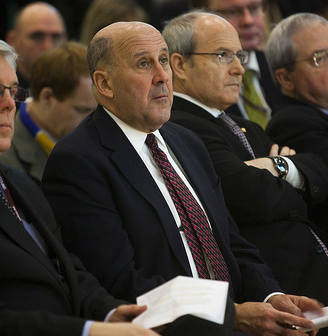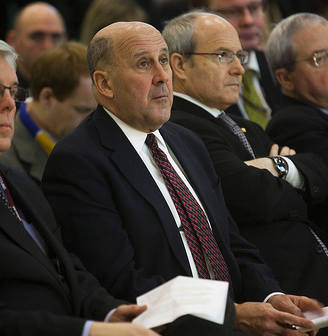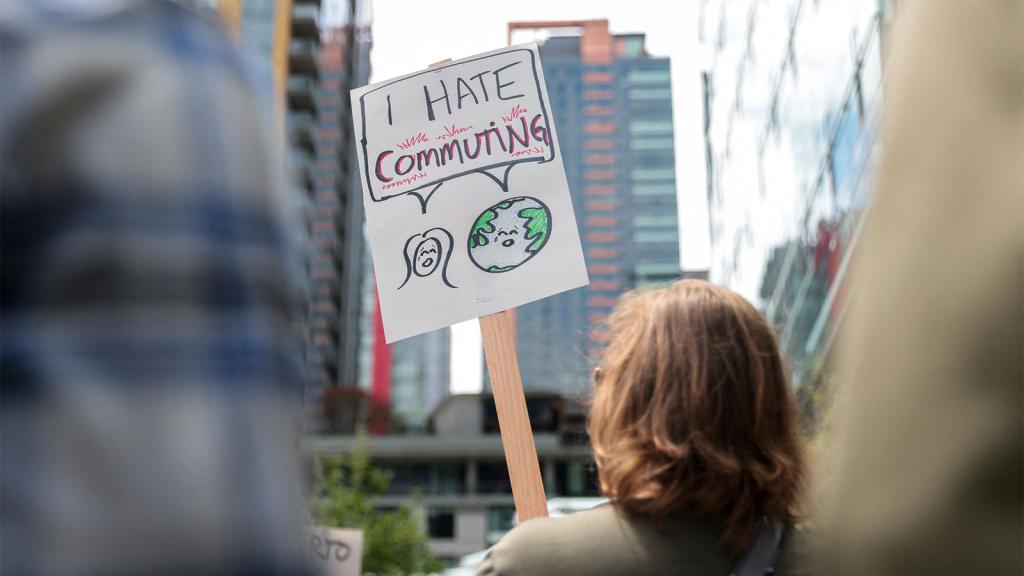When you think of renewable energy, the image that comes to mind is often a solar array in California, a windmill in Texas, or a cornfield in Iowa. Wisconsin Gov. Jim Doyle (D) wants you to think of Wisconsin first, which explains why he’s one of several governors attending the Copenhagen climate talks. I sat down with him for a brief interview. An edited transcript follows:
Q. Where are the opportunities for job development in the larger effort to achieve climate solutions?
 Wisconsin Gov. Jim Doyle (center) at the Climate Leaders Summit in Copenhagen.The Climate Group via Flickr
Wisconsin Gov. Jim Doyle (center) at the Climate Leaders Summit in Copenhagen.The Climate Group via Flickr
A. Well, for us in a state like Wisconsin where we don’t have oil, and we don’t have natural gas and we don’t have coal, it means every dollar we spend to create energy that comes from one of those fuel sources is a dollar that leaves the state of Wisconsin. So [we win] if we can produce energy from our agricultural fields, our forests, from our ingenuity, from our wind and sun, and if we can build the research capacity around all of that. …We have more people working manufacturing (percentage wise) than any state in the country. It’s great capacity. And as we focus that on the production of components for wind turbines, for solar panels, or other very high tech energy … that’s all jobs for us. So to me, we have set out as a goal that we really look to have about 10 percent of Wisconsin’s economy, if we do this right, 25 years from now, can be based on energy production and that’s a huge number of jobs.
…
One of the things we have been working really hard on in Wisconsin is biomedical research, and we’ve spun a lot of businesses out of the stem cell advances that happened in Wisconsin. So there you have creating jobs making people healthier. Here it’s the same thing really. We have the opportunity to create a lot of jobs and to do it in a way that makes the world a better place. … I believe very strongly that 15-20 years from now the states that have understood this now and have taken that opportunity are going to be moving rapidly and the states that didn’t are going to be sitting there wondering how come they didn’t get on that train.
Q. And is it mostly wind, or is it solar and wind?
A. For us it is solar and wind but we have a lot of farms and we have also vast forests. And we have huge research capacity. The University of Wisconsin in Madison has a multi-hundred-million-dollar energy industry that is focused on alternative energy sources, but particularly cellulosic [ethanol] that comes out of trees and plants but doesn’t compete with the food stream. … The other big advantage for jobs, we have big industry, we’re the number one paper-making state in the country [and] we’re one of the top food processing. Both of those industries have large waste streams and they spend a lot of money getting rid of them. Those waste streams are loaded with energy. So we’re working with them, and if we can help them reduce their operating costs [by channeling that waste to energy production] then they have [can divert the savings to creating] more jobs as well.
Q. The first thing people say when they hear about climate solutions is, “It’s going to cost us, it’s going to hurt the economy.” Why are people focused so much on the economic harm that climate solutions will bring rather than the economic benefits?
A. In some ways I think the environmental community hasn’t talked enough about that as this has all developed. But I’ll tell you there a lot of businesses, a lot of big businesses, that are very, very much behind this. So just today I met with Johnson Controls, which is our biggest publicly traded corporation in Wisconsin. It obviously makes much of its business … helping governments and businesses bring their energy costs down. There’s a good example right in Wisconsin. Our biggest company is doing that. And big into battery development… I think that the business organizations, … particularly the National Association for Manufacturers has taken this head-in-the-sand approach. But I believe … there are great businesses out there that are doing this not only because it’s the right thing to do, but if they can reduce their energy costs they can be much more profitable.
Q. Did you have a “eureka” moment where you realized when you decided climate and energy was extremely important.
A. I’d like to say there was some big eureka moment, but I just learned about it and studied it and then I talked to a lot of business people that really saw what the advantages were here. So I think anybody who looks at this understands climate change is a really significant issue, and we have to do something about it. So now the choice is do you do something about it in a way that actually grows your economy and creates jobs, or do you do something about it where you just get regulated to death? To me that choice is pretty easy. I was the [Wisconsin] attorney general before and was involved in a lot of environmental issues, but … within my first year as governor (seven years ago) we were moving on this.
Q. What do you think is driving the apparent rise of climate skepticism?
A. To me, even if you don’t believe in climate change, the job opportunities here, and the American security possibilities, having us less dependent on foreign oil … you’d think just those two things would [convince skeptics]. If we can produce our energy in the United States, we can do it in a cleaner way. … Even if you don’t believe the science (and it’s hard not to believe the science) the job opportunities, and the moving us away from dependence on foreign oil that should be enough for you.
Q. Al Gore this week said climate change makes us define who we are, it tests our mettle. Do you feel like this challenge for you as a governor is testing your mettle and making you define who you are?
A. Well it’s certainly a real test of all of us and of those of us who are leading — it’s a test. But … I just don’t see it so much as a sort of combat. I think the opportunities here are overwhelming, and so we just have to make sure that those opportunities are available for people. So in Wisconsin, why does a regular person who is working at a job, raising their kids, trying to do the right thing in the world, wanting to be environmentally responsible – Why do they get involved in this? Well, hopefully they get involved because it’s the right thing to do. But I think more importantly, they’ll get involved in it because the economy will benefit so much from it. And so I just see this really as an opportunity. Now it’s not that everybody sees that opportunity and we certainly have our fights over it. But in the long run it seems to me the economics of this are overpowering of what the possibilities are.
Check out our comprehensive coverage of what the føck is going on in Copenhagen, or track the latest from Grist on our Facebook page or the @grist Twitter feed.





